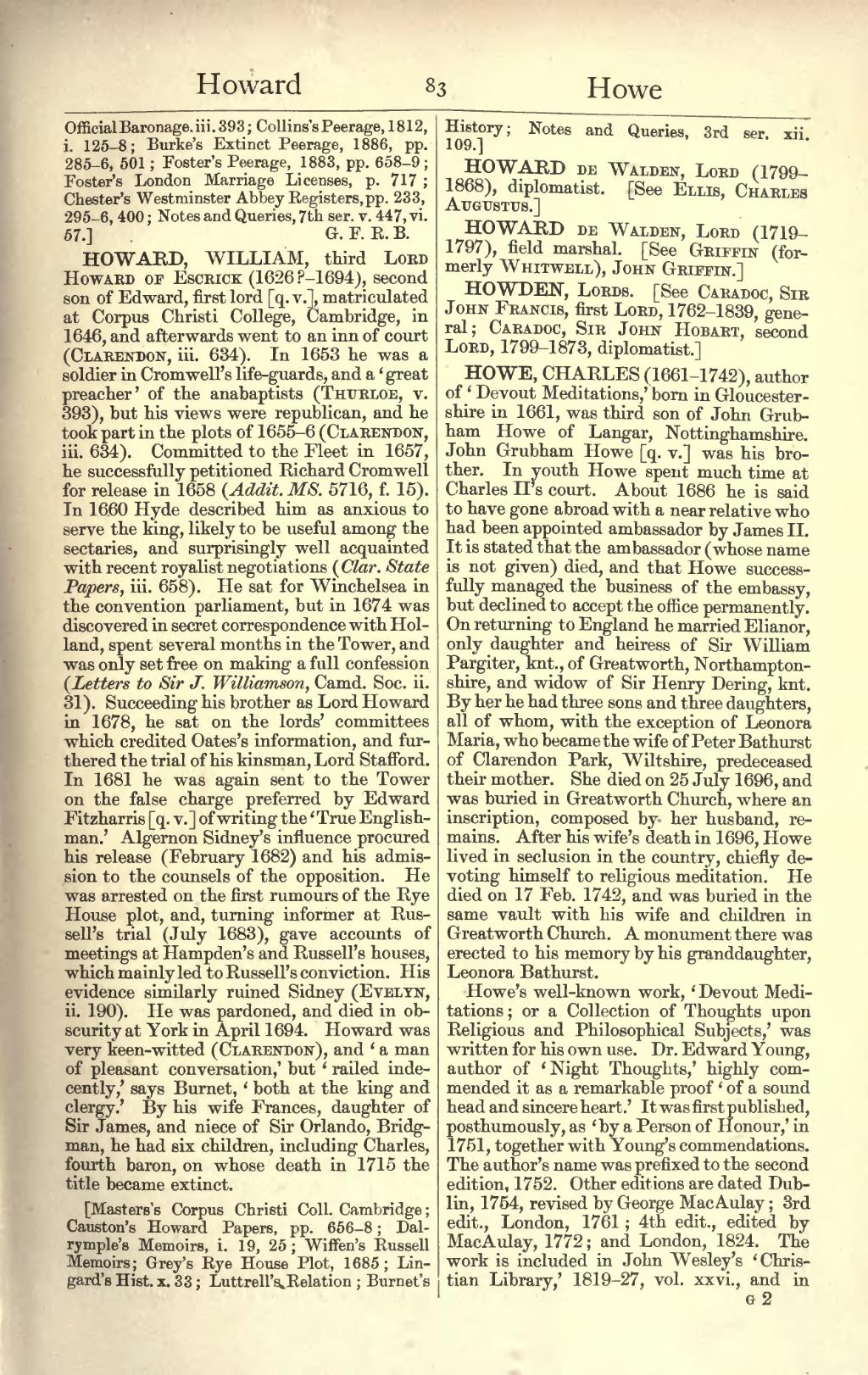HOWARD, WILLIAM, third Lord Howard of Escrick (1626?–1694), second son of Edward, first lord [q. v.], matriculated at Corpus Christi College, Cambridge, in 1646, and afterwards went to an inn of court (Clarendon, iii. 634). In 1653 he was a soldier in Cromwell's life-guards, and a ‘great preacher’ of the anabaptists (Thurloe, v. 393), but his views were republican, and he took part in the plots of 1655-6 (Clarendon, iii. 634). Committed to the Fleet in 1657, he successfully petitioned Richard Cromwell for release in 1658 (Addit. MS. 5716, f. 15). In 1660 Hyde described him as anxious to serve the king, likely to be useful among the sectaries, and surprisingly well acquainted with recent royalist negotiations (Clar. State Papers, iii. 658). He sat for Winchelsea in the convention parliament, but in 1674 was discovered in secret correspondence with Holland, spent several months in the Tower, and was only set free on making a full confession (Letters to Sir J. Williamson, Camd. Soc. ii. 31). Succeeding his brother as Lord Howard in 1678, he sat on the lords' committees which credited Oates's information, and furthered the trial of his kinsman, Lord Stafford. In 1681 he was again sent to the Tower on the false charge preferred by Edward Fitzharris [q. v.] of writing the ‘True Englishman.’ Algernon Sidney's influence procured his release (February 1682) and his admission to the counsels of the opposition. He was arrested on the first rumours of the Rye House plot, and, turning informer at Russell's trial (July 1683), gave accounts of meetings at Hampden's and Russell's houses, which mainly led to Russell's conviction. His evidence similarly ruined Sidney (Evelyn, ii. 190). He was pardoned, and died in obscurity at York in April 1694. Howard was very keen-witted (Clarendon), and ‘a man of pleasant conversation,’ but ‘railed indecently,’ says Burnet, ‘both at the king and clergy.’ By his wife Frances, daughter of Sir James, and niece of Sir Orlando Bridgman, he had six children, including Charles, fourth baron, on whose death in 1715 the title became extinct.
[Masters's Corpus Christi Coll. Cambridge; Causton's Howard Papers, pp. 656-8; Dalrymple's Memoirs, i. 19, 25; Wiffen's Russell Memoirs; Grey's Rye House Plot, 1685; Lingard's Hist. x. 33; Luttrell's Relation; Burnet's History; Notes and Queries, 3rd ser. xii. 109.]
HOWARD de Walden, Lord (1799–1868), diplomatist. [See Ellis, Charles Augustus.]
HOWARD de Walden, Lord (1719–1797), field marshal. [See Griffen (formerly Whitwell), John Griffin.]
HOWDEN, Lords. [See Caradoc, Sir John Francis, first Lord, 1762–1839, general; Caradoc, Sir John Hobart, second Lord, 1799–1873, diplomatist.]
HOWE, CHARLES (1661–1742), author of ‘Devout Meditations,’ born in Gloucestershire in 1661, was third son of John Grubham Howe of Langar, Nottinghamshire. John Grubham Howe [q. v.] was his brother. In youth Howe spent much time at Charles II's court. About 1686 he is said to have gone abroad with a near relative who had been appointed ambassador by James II. It is stated that the ambassador (whose name is not given) died, and that Howe successfully managed the business of the embassy, but declined to accept the office permanently. On returning to England he married Elianor, only daughter and heiress of Sir William Pargiter, knt., of Greatworth, Northamptonshire, and widow of Sir Henry Dering, knt. By her he had three sons and three daughters, all of whom, with the exception of Leonora Maria, who became the wife of Peter Bathurst of Clarendon Park, Wiltshire, predeceased their mother. She died on 25 July 1696, and was buried in Greatworth Church, where an inscription, composed by her husband, remains. After his wife's death in 1696, Howe lived in seclusion in the country, chiefly devoting himself to religious meditation. He died on 17 Feb. 1742, and was buried in the same vault with his wife and children in Greatworth Church. A monument there was erected to his memory by his granddaughter, Leonora Bathurst.
Howe's well-known work, ‘Devout Meditations; or a Collection of Thoughts upon Religious and Philosophical Subjects,’ was written for his own use. Dr. Edward Young, author of 'Night Thoughts,' highly commended it as a remarkable proof ‘of a sound head and sincere heart.’ It was first published, posthumously, as ‘by a Person of Honour,’ in 1751, together with Young's commendations. The author's name was prefixed to the second edition, 1752. Other editions are dated Dublin, 1754, revised by George MacAulay; 3rd edit., London, 1761; 4th edit., edited by MacAulay, 1772; and London, 1824. The work is included in John Wesley's ‘Christian Library,’ 1819-27, vol. xxvi., and in
